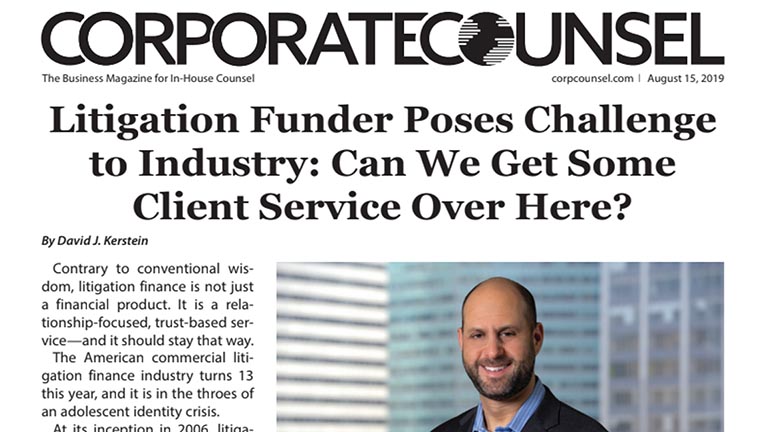August 23, 2019

By David J. Kerstein
Article originally appeared in Corporate Counsel on August 15, 2019
Contrary to conventional wisdom, litigation finance is not just a financial product. It is a relationship-focused, trust-based service—and it should stay that way.
The American commercial litigation finance industry turns thirteen this year, and it is in the throes of an adolescent identity crisis.
At its inception in 2006, litigation finance was a niche service provided to a small number of clients by an even smaller number of funders. It was so new that each deal had to be structured and negotiated almost from scratch. Today, funders have approximately $3 billion in capital to deploy in American commercial disputes and international arbitration. Many companies and law firms now consider litigation finance to be an essential tool for managing litigation cost and risk. Clients have more funders to choose from, the underwriting process has become more streamlined, and funders are offering an increasingly creative array of funding structures. These are all positive developments.
However, rapid growth can sometimes lead to loss of focus. If you were to randomly sample media coverage of the industry in the past few years, you would encounter numerous stories of brand-name investors making “big bets” on American litigation, or discussion of litigation as a new “financial product,” or hailing litigation finance as an “uncorrelated asset” whose performance does not track the public securities markets. Some funders even adopt that language in their own press releases and marketing materials.
Litigation finance is a financial product in the sense that funders need investor capital to do their job. But investors are not the real story. Clients are the story. The consumers of litigation finance often have no choice but to litigate high-stakes disputes. They are companies who need to defend intellectual property that took years to develop; they are multi-generation family enterprises in a make-or-break dispute with their largest supplier; they are businesses struck by natural disaster who desperately need insurance proceeds to rebuild.
Is the litigation finance industry serving these clients well? Our firm recently teamed up with American Lawyer Intelligence to find out. We crafted a survey which sought to learn what clients and lawyers really want and need from litigation funders—what they think of the industry, what they worry about, what makes for a good funding relationship, what constitutes a fair investment agreement, and where the industry has opportunities to improve. More than 330 corporate lawyers, both in-house and at law firms, responded, which makes our survey one of the largest of the American litigation finance market to date.
If we think about the survey as a sort of midterm exam for the industry, clients gave litigation finance mixed grades. The positive news is that both in-house and corporate counsel who had direct experience using litigation finance almost unanimously viewed it as a useful tool: 98% said they would use it again—an enviable loyalty rate for any product or service.
That said, clients weren’t ready to hand the industry an A+ on all fronts. A number of survey respondents had the perception that funders were only out for profit and did not prioritize client needs.
The fairness of financing terms was respondents’ biggest priority. Seventy-one percent thought that any arrangement in which the client stood to receive less than 50% of the litigation proceeds was unfair. Two-thirds of respondents who had personal experience using litigation finance were dissatisfied with the ultimate returns their clients received. Our firm has publicly committed to structuring deals so that the client receives at least 50%, and more likely 60%, of case proceeds, but these responses indicate that some funders are offering terms that are much less favorable. Fairness is something the industry as a whole will need to continue working toward in order to build sustainable client demand.
Another interesting finding from the survey: 83% of in-house lawyers and 97% of outside counsel prioritize trust in choosing a funder. In addition to fair financing terms, the components of trust respondents cared most about were transparency in the process, and the clarity of documentation. Clients’ desire for a sense of trust dovetails with the [49]% of litigation finance users who listed the “collaborative relationship” with a funder as one of the factors they liked about the funding relationship.
When clients contemplate litigation funding, the ethos, ethical standards and collaborative nature of the legal profession still predominate over the Wall Street mindset. The best hope for our industry as it matures is that funders not treat litigation as an “uncorrelated asset” to package for the benefit of big investors. On the contrary, the future of litigation finance is based on trust, collaboration, and a commitment to serving clients who need access to the civil justice system.
David J. Kerstein is Chief Risk Officer at Validity Finance, a legal finance company with offices in New York, Houston and Chicago. He can be reached at dave@validity-finance.com.